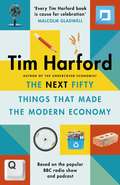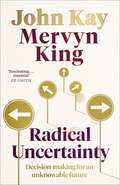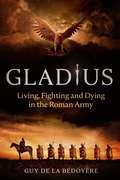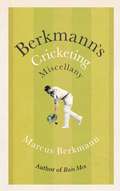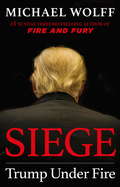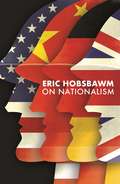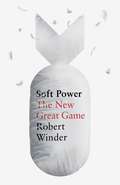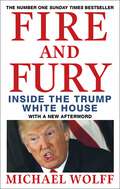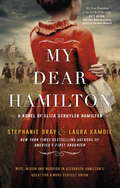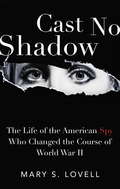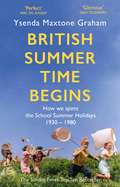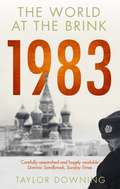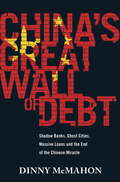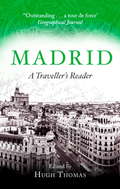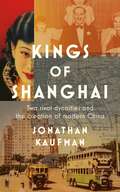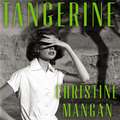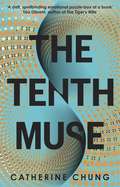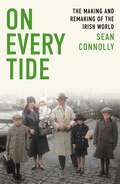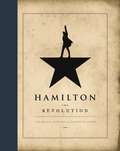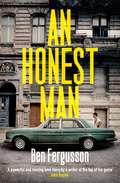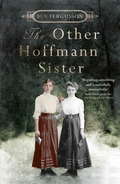- Table View
- List View
The Next Fifty Things that Made the Modern Economy
by Tim Harford'Endlessly insightful and full of surprises - exactly what you would expect from Tim Harford' BILL BRYSON'Entertaining . . . A lively introduction to some of the most ingenious, yet often overlooked inventions that have changed the way we live' The Times'Every Tim Harford book is cause for celebration' MALCOLM GLADWELL'Harford is a fine, perceptive writer, and an effortless explainer of tricky concepts. His book teems with good things, and will expand the mind of anyone lucky enough to read it' Daily MailIn Fifty Things that Made the Modern Economy, the revolutionary, acclaimed book, radio series and podcast, bestselling economist Tim Harford introduced us to a selection of fifty radical inventions that changed the world.Now, in this new book, Harford once again brings us an array of remarkable, memorable, curious and often unexpected 'things' - inventions that teach us lessons by turns intimate and sweeping about the complex world economy we live in today.From the brick, blockchain and the bicycle to fire, the factory and fundraising, and from solar PV and the pencil to the postage stamp, this brilliant and enlightening collection resonates, fascinates and stimulates. It is a wonderful blend of insight and inspiration from one of Britain's finest non-fiction storytellers.
Radical Uncertainty: Decision-making for an unknowable future
by John Kay Mervyn KingLONGLISTED FOR THE FT/MCKINSEY BUSINESS BOOK OF THE YEAR AWARD 2020'A brilliant new book' Daily Telegraph'Well written . . . and often entertaining'The Times'A sparkling analysis'Prospect'Entertaining and enlightening . . . This is a necessary critique and they make it with verve, knowledge and a wealth of stories' Financial Times'An elegant, wise and timely book' Irish Times'Jam-packed with erudition' New StatesmanThis major, critically acclaimed work asks a vitally important question for today: when uncertainty is all around us, and the facts are not clear, how can we make good decisions? We do not know what the future will hold, particularly in the midst of a crisis, but we must make decisions anyway. We regularly crave certainties which cannot exist and invent knowledge we cannot have, forgetting that humans are successful because we have adapted to an environment that we understand only imperfectly. Throughout history we have developed a variety of ways of coping with the radical uncertainty that defines our lives. This incisive and eye-opening book draws on biography, history, mathematics, economics and philosophy to highlight the most successful - and most short-sighted - methods of dealing with an unknowable future. Ultimately, the authors argue, the prevalent method of our age falls short, giving us a false understanding of our power to make predictions, leading to many of the problems we experience today.
Gladius: Living, Fighting and Dying in the Roman Army
by Guy de BédoyèreThe Roman army was the greatest fighting machine the ancient world produced. The Roman Empire depended on soldiers not just to win its wars, defend its frontiers and control the seas but also to act as the engine of the state. Roman legionaries and auxiliaries came from across the Roman world and beyond. They served as tax collectors, policemen, surveyors, civil engineers and, if they survived, in retirement as civic worthies, craftsmen and politicians. Some even rose to become emperors. Gladius takes the reader right into the heart of what it meant to be a part of the Roman army through the words of Roman historians, and those of the men themselves through their religious dedications, tombstones, and even private letters and graffiti. Guy de la Bédoyère throws open a window on how the men, their wives and their children lived, from bleak frontier garrisons to guarding the emperor in Rome, enjoying a ringside seat to history fighting the emperors' wars, mutinying over pay, marching in triumphs, throwing their weight around in city streets, and enjoying esteem in honorable retirement.
Berkmann's Cricketing Miscellany
by Marcus BerkmannMarcus Berkmann, author of the cricket classics Rain Men and Zimmer Men, returns to the great game with this irresistible miscellany of cricketing trivia, stories and more fascinating facts than Geoffrey Boycott could shake a stick of rhubarb at. Which England captain smoked two million cigarettes in his lifetime? Which Australian captain, asked what his favourite animal was, said 'Merv Hughes'? What did Hitler think of cricket? Which National Hunt trainer had a dog called Sobers? Who was described in his obituary as 'perhaps the only unequivocally popular man in Yorkshire'?No other sport is so steeped in oddness and eccentricity. There's the only Test player ever to be executed for murder, the only first-class cricketer to die on the Titanic, and the only bestselling author to catch fire while playing at Lord's. (It was Sir Arthur Conan Doyle. The ball hit a box of matches in his pocket.) All cricket is here, including an XI entirely made up of players who share their names with freshwater fish.
Siege: Trump Under Fire
by Michael WolffMichael Wolff, author of the bombshell bestseller Fire and Fury, once again takes us inside the Trump presidency to reveal a White House under siege.Just one year into Donald Trump's term as president, Michael Wolff told the electrifying story of a White House consumed by controversy, chaos and intense rivalries. Fire and Fury, an instant sensation, defined the first phase of the Trump administration; now, in Siege, Wolff has written an equally essential and explosive book about a presidency that is under fire from almost every side.At the outset of Trump's second year as president, his situation is profoundly different. No longer tempered by experienced advisers, he is more impulsive and volatile than ever. But the wheels of justice are inexorably turning: Robert Mueller's 'witch hunt' haunts Trump every day, and other federal prosecutors are taking a deep dive into his business affairs. Many in the political establishment - even some members of his own administration - have turned on him and are dedicated to bringing him down. The Democrats see victory at the polls, and perhaps impeachment, in front of them. Trump, meanwhile, is certain he is invincible, making him all the more exposed and vulnerable. Week by week, as Trump becomes increasingly erratic, the question that lies at the heart of his tenure becomes ever more urgent: Will this most abnormal of presidencies at last reach the breaking point and implode?Both a riveting narrative and a brilliant front-lines report, Siege provides an alarming and indelible portrait of a president like no other. Surrounded by enemies and blind to his peril, Trump is a raging, self-destructive inferno ? and the most divisive leader in American history.
On Nationalism
by Eric HobsbawmI remain in the curious position of disliking, distrusting, disapproving and fearing nationalism wherever it exists . . . but recognising its enormous force, which must be harnessed for progress if possible.In the last two decades the uses of the term 'nationalism' has increased steeply with the rising tide of nationalist parties. In this collection of historian Eric Hobsbawm's writing on nationalism, we see some of the critical historical insights he brings to bear on this contentious subject, which is more than ever relevant as we stand on the doorstep of an age when the internet and the globalisation of capital threaten to blow away many national boundaries while, as a reaction, nationalism seems to re-emerge with renewed strength.More than any other historian of our time, Hobsbawm took great care to seriously consider these movements, and never to decry nationalism and patriotism as simply absurd. The clarity of his insight is as vital today as it was in his lifetime: On Nationalism is an essential work for anyone who wants to understand the phenomenon.
Soft Power: The New Great Game
by Robert WinderIn recent years the modern world has developed a brave new concept: 'soft power'. It is the power of friendly persuasion rather than command, and it invites nations to compete (as they did in the nineteenth century) to expand their 'sphere of influence' as brands in a global marketplace. In Bloody Foreigners and The Last Wolf, Robert Winder explored the way Britain was shaped first by migration, and then by hidden geographical factors. Now, in Soft Power he reveals the ways in which modern states are asserting themselves not through traditional realpolitik but through alternative means: business, language, culture, ideas, sport, education, music, even food - the texture and values of history and daily life. Moving from West to East, the book tells the story of soft power by exploring the varied ways in which it operates - from an American sheriff in Poland to an English garden in Ravello, a French vineyard in Australia, an Asian restaurant in Spain, a Chinese Friendship Hall in Sudan; the fact that fifty-eight modern heads of state were educated in Britain; the student exchange that took a teenage Deng Xiaoping to a small town on the Loire; the way that Japan could seduce the world with chic food and smart computer games. Now there may be a new twist in this Great game. With soft power's quiet ingredients - education, science, trade, cultural values - and a new emphasis on shared mutual interest, it may be the only force supple enough to tackle the challenges the future looks likely to pose - not least the slam-the-door reflexes pulling in the other direction.
Soft Power: The New Great Game
by Robert WinderIn recent years the modern world has developed a brave new concept: 'soft power'. It is the power of friendly persuasion rather than command, and it invites nations to compete (as they did in the nineteenth century) to expand their 'sphere of influence' as brands in a global marketplace. In Bloody Foreigners and The Last Wolf, Robert Winder explored the way Britain was shaped first by migration, and then by hidden geographical factors. Now, in Soft Power he reveals the ways in which modern states are asserting themselves not through traditional realpolitik but through alternative means: business, language, culture, ideas, sport, education, music, even food - the texture and values of history and daily life. Moving from West to East, the book tells the story of soft power by exploring the varied ways in which it operates - from an American sheriff in Poland to an English garden in Ravello, a French vineyard in Australia, an Asian restaurant in Spain, a Chinese Friendship Hall in Sudan; the fact that fifty-eight modern heads of state were educated in Britain; the student exchange that took a teenage Deng Xiaoping to a small town on the Loire; the way that Japan could seduce the world with chic food and smart computer games. Now there may be a new twist in this Great game. With soft power's quiet ingredients - education, science, trade, cultural values - and a new emphasis on shared mutual interest, it may be the only force supple enough to tackle the challenges the future looks likely to pose - not least the slam-the-door reflexes pulling in the other direction.
Fire and Fury
by Michael WolffSUNDAY TIMES NUMBER ONE BESTSELLERNEW YORK TIMES NUMBER ONE BESTSELLERWith extraordinary access to the Trump White House, Michael Wolff tells the inside story of the most controversial presidency of our time.The first nine months of Donald Trump's term were stormy, outrageous - and absolutely mesmerising. Now, thanks to his deep access to the West Wing, bestselling author Michael Wolff tells the riveting story of how Trump launched a tenure as volatile and fiery as the man himself.In this explosive book, Wolff provides a wealth of new details about the chaos in the Oval Office. Among the revelations: - What President Trump's staff really thinks of him- What inspired Trump to claim he was wire-tapped by President Obama - Why FBI director James Comey was really fired- Why chief strategist Steve Bannon and Trump's son-in-law Jared Kushner couldn't be in the same room - Who is really directing the Trump administration's strategy in the wake of Bannon's firing- What the secret to communicating with Trump is- What the Trump administration has in common with the movie The ProducersNever before has a presidency so divided the American people. Brilliantly reported and astoundingly fresh, Michael Wolff's Fire and Fury shows us how and why Donald Trump has become the king of discord and disunion.
My Dear Hamilton: discover Eliza's story . . . perfect for fans of hit musical Hamilton!
by Stephanie Dray Laura KamoieLove Lin-Manuel Miranda's hit musical Hamilton? Discover the untold story of the brilliant Eliza Schuyler Hamilton!Coming of age in revolutionary New York, Elizabeth Schuyler is proud to champion the fight for independence. And when she meets Alexander Hamilton, Washington's penniless but passionate right hand man, she's captivated by the young officer's charisma and brilliance. Despite the perilous times and Alexander's background, they fall in love and are soon married. From glittering balls to bloody street riots, the Hamiltons are at the centre of it all - including America's first sex scandal, which forces Eliza to struggle through heartbreak and betrayal to find forgiveness. And when a duel destroys Eliza's hard-won peace, the grieving widow fights her husband's enemies to preserve Alexander's legacy. But long-buried secrets threaten everything Eliza believes about her marriage and her own legacy. Questioning her tireless devotion to the man and country that have broken her heart, she's left with one last battle - to understand the flawed man she married and imperfect union he could never have created without her . . .Haunting, moving, and beautifully written, Dray and Kamoie use thousands of letters and original sources to tell Eliza's story as it's never been told before - not just as the wronged wife but as a strong woman who shaped an American legacy in her own right.'Full of history, engaging characters who shimmer on each page, and a tremendous love story, this is a book for everyone' Karen White, New York Times bestselling author'An unforgettable story of the woman behind Hamilton - a triumph!' Pam Jenoff, New York Times bestselling author'My Dear Hamilton is the book of the year' Kate Quinn, USA Today bestselling author of The Alice Network'Historical fiction at its most addictive!' Stephanie Thornton, author of The Tiger Queens'An incredible, surprising, and altogether lovely tribute to the woman who stood beside one of the most unknowable, irascible, energetic, and passionate of men' Lars Hedbor, author of The Path: Tales from a Revolution
Cast No Shadow
by Mary S. LovellThe legend of Betty Pack is simple enough. She was a beautiful American spy recruited first by the British Secret lntelligence Service in 1938 and later by the American OSS. Her method of obtaining information was singular: seduction. In Cast No Shadow Mary Lovell, author of Straight On Till Morning, the internationally acclaimed and best-selling biography of Beryl Markham, gives us for the first time the complete story behind the legend of this modern-day Mata Hari, a story more astounding than the legend.Betty Pack's milieu was the aristocratic world of international diplomatic society The wife of a career British diplomat-the marriage for both partners had quickly become an arrangement of convenience, not passion - Betty would be witness to and participant in many of the most intense historic moments of the twentieth century: in civil war-torn Madrid, besieged Warsaw occupied Paris, wartime Washington. In each locale, Betty's entrée into diplomatic circles and her own penchant for seeking out men at the center of conflict made her a spy whose love of adventure was matched only by her talent for uncovering the enemy's secrets. Betty often knew what information her spymasters wanted; more important, she knew whom to approach and seduce in order to obtain it.Relying on top-secret and heretofore unrevealed documents from British Intelligence as well as on Betty's own memoir written shortly before her death, Mary Lovell offers a remarkable portrait of a woman whose adeptness for intrigue in affairs of espionage and passion is astonishing. Cast No Shadow is a story of subterfuge and romantic expediency the exposes the hidden human intrigue of World War II and the life of a woman whose contribution to the Allied effort was invaluable and unique.
British Summer Time Begins: The School Summer Holidays 1930-1980
by Ysenda Maxtone GrahamBritish Summer Time Begins is about summer holidays of the mid-twentieth century and how they were spent, as recounted to Ysenda Maxtone-Graham in vividly remembered detail by people who were there. Through this prism, it paints a revealing portrait of twentieth-century Britain in summertime: how we were, how families functioned, what houses and gardens and streets were like, what journeys were like, and what people did all day in their free time. It explores their expectations, hopes, fears and habits, the rules or lack of rules under which they lived, their happiness and sadness, their sense of being treasured or neglected - all within living memory, from pre-war summers to the late 1970s. Ysenda takes us back to the long stretch of time from the last days of June till the early days of September - those months when the term-time self was cast off and you could become the person you really were, and you had (if you were lucky) enough hours in the endless succession of days to become good at the things that would later define your adulthood. The 'showpiece' part of the summer holidays was 'the summer holiday', when families took off to the seaside, or to grandparents' houses teeming with cousins, or on early package holidays to France or Spain, siblings wedged into the back of small cars, roof-racks clattering, mothers preparing picnics. British Summer Time Begins is as much about the long weeks either side of that holiday as the trip itself: the weeks when nothing much officially happened, boredom often lurked nearby, and you vanished for hours on end, nobody much knowing or even caring where you were. Could it be that those unscheduled days were actually the most important and formative of your life?From the author of the beloved Terms & Conditions, British Summer Time Begins is a delightful, nostalgic and joyous celebration of summers.
British Summer Time Begins: The School Summer Holidays 1930-1980
by Ysenda Maxtone GrahamBritish Summer Time Begins is about summer holidays of the mid-twentieth century and how they were spent, as recounted to Ysenda Maxtone-Graham in vividly remembered detail by people who were there. Through this prism, it paints a revealing portrait of twentieth-century Britain in summertime: how we were, how families functioned, what houses and gardens and streets were like, what journeys were like, and what people did all day in their free time. It explores their expectations, hopes, fears and habits, the rules or lack of rules under which they lived, their happiness and sadness, their sense of being treasured or neglected - all within living memory, from pre-war summers to the late 1970s. Ysenda takes us back to the long stretch of time from the last days of June till the early days of September - those months when the term-time self was cast off and you could become the person you really were, and you had (if you were lucky) enough hours in the endless succession of days to become good at the things that would later define your adulthood. The 'showpiece' part of the summer holidays was 'the summer holiday', when families took off to the seaside, or to grandparents' houses teeming with cousins, or on early package holidays to France or Spain, siblings wedged into the back of small cars, roof-racks clattering, mothers preparing picnics. British Summer Time Begins is as much about the long weeks either side of that holiday as the trip itself: the weeks when nothing much officially happened, boredom often lurked nearby, and you vanished for hours on end, nobody much knowing or even caring where you were. Could it be that those unscheduled days were actually the most important and formative of your life?From the author of the beloved Terms & Conditions, British Summer Time Begins is a delightful, nostalgic and joyous celebration of summers.
1983: The World at the Brink
by Taylor Downing'A carefully researched and hugely readable account of the build-up to war, the momentum inexorably growing as he assembles each part of the jigsaw. Indeed, his narrative is so persuasive that by the time you are about two- thirds through, it takes some effort to remind yourself that the Third World War never happened' Dominic Sandbrook, Sunday Times1983 was a supremely dangerous year - even more dangerous than 1962, the year of the Cuban Missile Crisis. In the US, President Reagan massively increased defence spending, described the Soviet Union as an 'evil empire' and announced his 'Star Wars' programme, calling for a shield in space to defend the US from incoming missiles.Yuri Andropov, the paranoid Soviet leader, saw all this as signs of American aggression and convinced himself that the US really meant to attack the Soviet Union. He put the KGB on alert to look for signs of an imminent nuclear attack. When a Soviet fighter jet shot down Korean Air Lines flight KAL 007 after straying off course over a sensitive Soviet military area, President Reagan described it as a 'terrorist act' and 'a crime against humanity'. The temperature was rising fast.Then at the height of the tension, NATO began a war game called Able Archer 83. In this exercise, NATO requested permission to use the codes to launch nuclear weapons. The nervous Soviets convinced themselves this was no exercise but the real thing.This is an extraordinary and largely unknown Cold War story of spies and double agents, of missiles being readied, of intelligence failures, misunderstandings and the panic of world leaders. With access to hundreds of extraordinary new documents just released in the US, Taylor Downing is able to tell for the first time the gripping but true story of how near the world came to the brink of nuclear war in 1983. 1983: The World at the Brink is a real-life thriller.
China's Great Wall of Debt: Shadow Banks, Ghost Cities, Massive Loans and the End of the Chinese Miracle
by Dinny McMahon'One of the clearest and most thorough statements of an argument often made about the country: that its government has relied on constant stimulus to keep growth strong, an addiction that is bound to backfire. Second, he comes closer than any previous writer to covering the Chinese economy as Michael Lewis, the hugely popular author of The Big Short, might do. His analysis is informed but accessible, animated by anecdotes and characters, some colourful, some verging on tragic . . . McMahon is among the most compelling of the many analysts who conclude that China's economic miracle will end painfully' The EconomistThe world has long considered China a juggernaut of economic strength, but since the global financial crisis, the country's economy has ballooned in size, complexity, and risk. Once dominated by four state-owned banks, the nation's financial system is a tangle of shadow banking entities, informal financial institutions, and complex corporate funding arrangements that threaten growth, stability, and reform efforts. The country has accumulated so much debt so quickly that economists increasingly predict a financial crisis that could make 'Brexit' or Greece's economic ruin seem minor, and could undermine China's ascent as a superpower. Earlier this year, President Xi Jinping issued an urgent call for reform that gives the country until 2020 to transform its economy - a vaguely-defined objective that most economists agree is unrealistic. Whether or not China will be responsible for the next global recession, as some experts forecast, the fate of its economy will have far-reaching consequences for the rest of the world. Yet the inner workings of China's financial system are still very much a mystery to most outsiders. Now more than ever, as the country's slowing economy is being felt around the globe, it is essential to understand how China allowed its economy to become so mired in debt. China's Great Wall of Debt is a penetrating examination of the country's opaque financial system and the complex factors - demographic shifts; urbanization; industrialization; a pervasive over-reliance on debt-fueled investments - that have brought the country to the brink of crisis. Anchored by stories of China's cities and its people; from factory workers and displaced farmers to government officials and entrepreneurs, the narrative will take readers inside the country's ghost cities, zombie companies, start-ups, and regulatory institutions as McMahon explains how things got so bad, why fixing the problems is so hard, and what the economic outlook means for China and for the rest of us.
Madrid: A Traveller's Reader (Traveller's Reader)
by Hugh ThomasThe charm of Madrid is elusive, but for those who know how to find it, Madrid has magic. Its magic can be found in the shadow cast over the present by the past. In this Traveller's Reader, a city that was once the seat of power for perhaps the most ambitious political enterprise the western world had seen since the fall of Rome, the Spanish Empire, is brought to life in vivid diaries, letters, memoirs and histories.The Earl of Clarendon describes seventeenth-century bullfights; Salvador Dali plays a surrealist joke on a snooty barman at the Ritz; Rubens visits the Alcázar; Manet is at the Prado; generals and anarchists meet in the Puerta del Sol. The many stories included here evoke for today's tourist the dramas and personalities of a city's past, by drawing on the eyewitness accounts and commentaries of visitors and residents of earlier centuries. Hugh Thomas has chosen these and other vivid snapshots of Madrid's history from diaries, letters, memoirs and novels across five centuries to delight and fascinate the armchair and prospective traveller alike.
Kings of Shanghai: The Rival Jewish Dynasties That Helped Create Modern China
by Jonathan Kaufman'A masterpiece of research, The Last Kings of Shanghai is a vivid and fascinating story of wealth, family intrigue, and political strategy on the world stage from colonialism to communism to globalized capitalism' Susannah Heschel, Eli Black Professor of Jewish Studies, Dartmouth CollegeAn epic, multigenerational story of two rival dynasties who flourished in Shanghai and Hong Kong as twentieth-century China surged into the modern eraShanghai, 1936. The Cathay Hotel, located on the city's famous waterfront, is one of the most glamorous in the world. Built by Victor Sassoon - billionaire playboy and scion of the Sassoon dynasty - the hotel hosts a who's who of global celebrities: Noel Coward has written a draft of Private Lives in his suite, Charlie Chaplin entertained his wife-to-be, and the American socialite Wallis Simpson reportedly posed for 'glamour' photographs. A few miles away, Mao and the nascent Communist party have been plotting revolution before being forced to flee the city.By the 1930s, the Sassoons had been doing business in China for a century, rivaled in wealth and influence by only one other dynasty - the Kadoories. These two Jewish families, both originally from Baghdad, stood astride Chinese business and politics for more than one hundred and seventy five years, profiting from the Opium Wars; surviving Japanese occupation; courting Chiang Kai-shek; and nearly losing everything as the Communists swept into power. In Kings of Shanghai, Jonathan Kaufman tells the remarkable history of how these families ignited an economic boom and opened China to the world, but remained blind to the country's deep inequality and to the political turmoil on their doorsteps. In a story stretching from Baghdad to Hong Kong to Shanghai to London, Kaufman enters the lives and minds of these ambitious men and women to forge a tale of opium smuggling, family rivalry, political intrigue and survival.
Tangerine
by Christine Mangan'Girl on a Train meets The Talented Mr Ripley under the Moroccan sun. Unputdownable' The TimesThe perfect read for fans of Daphne du Maurier and Patricia Highsmith, set in 1950s Morocco, Tangerine is a gripping psychological literary thriller.The last person Alice Shipley expected to see since arriving in Tangier with her new husband was Lucy Mason. After the horrific accident at Bennington, the two friends - once inseparable roommates - haven't spoken in over a year. But Lucy is standing there, trying to make things right. Perhaps Alice should be happy. She has not adjusted to life in Morocco, too afraid to venture out into the bustling medinas and oppressive heat. Lucy, always fearless and independent, helps Alice emerge from her flat and explore the country. But soon a familiar feeling starts to overtake Alice - she feels controlled and stifled by Lucy at every turn. Then Alice's husband, John, goes missing, and Alice starts to question everything around her: her relationship with her enigmatic friend, her decision to ever come to Tangier, and her very own state of mind.Tangerine is an extraordinary debut, so tightly wound, so evocative of 1950s Tangier, and so cleverly plotted that it will leave you absolutely breathless.
The Tenth Muse
by Catherine Chung'A young woman's battle for acceptance in a male-dominated world; her misadventures in love; and her torturous journey to track down her real parents in Germany' Mail on Sunday Best New FictionFrom childhood, Katherine knows she is different, and that her parents are not who they seem to be. But as she grows up and becomes a mathematician, she faces the most human of problems - who is she? What is the cost of love, and what is the cost of ambition? On her quest to conquer the Riemann hypothesis, the greatest unsolved mathematical problem of her time, she turns to a theorem with a mysterious history that holds both the lock and key to her identity, and to secrets long buried during World War II. Forced to confront some of the biggest events of the twentieth century and rethink everything she knows of herself, Katherine strives to take her place in the world of higher mathematics, reclaiming the voices of the women who came before her whose love of the language of numbers connects them across generations.
On Every Tide: The making and remaking of the Irish world
by Sean ConnollyON EVERY TIDE is a wide-ranging and challenging reassessment of the Irish diaspora. Drawing on the latest ground-breaking research, and his own career-long engagement with the complexities of Irish identity, Sean Connolly reveals the forces that compelled millions of Irish men and women to abandon their homeland, and explores their new lives in America, Canada, Australia, New Zealand and elsewhere.What emerges is an Irish story, but also a chapter in world history. Irish emigrants fled a society blighted by poverty and lack of opportunity. But they also became part of a massive population movement, driven by the requirements of an ever more interconnected world economy, that transported the adventurous and the desperate to new parts of the globe. What distinguishes the Irish from tens of millions of other European immigrants is the position they established in their new homes. Initially treated as a despised and exploited underclass, they created a commanding position, in politics, in the labour movement, and, by the twentieth century, as cultural icons. From his starting point in the grim realities of Famine and social crisis, Sean Connolly takes the reader forward into the twentieth century, when Ireland itself has become a receiver rather than an exporter of emigrants, and when a reimagined Irishness has become a commodity to be marketed to a global audience. On Every Tide plays directly into wider, contemporary debates about migration, as well as offering a unique and distinctive view of two hundred years of Irish history.
Hamilton: The Revolution
by Lin-Manuel Miranda Jeremy McCarterWinner of the 2016 Pulitzer Prize for DramaNow a major motion picture, available on Disney Plus.Goodreads best non-fiction book of 2016From Tony Award-winning composer-lyricist-star Lin-Manuel Miranda comes a backstage pass to his groundbreaking, hit musical Hamilton.Lin-Manuel Miranda's groundbreaking musical Hamilton is as revolutionary as its subject, the poor kid from the Caribbean who fought the British, defended the Constitution, and helped to found the United States. Fusing hip-hop, pop, R&B, and the best traditions of theater, this once-in-a-generation show broadens the sound of Broadway, reveals the storytelling power of rap, and claims the origins of the United States for a diverse new generation.HAMILTON: THE REVOLUTION gives readers an unprecedented view of both revolutions, from the only two writers able to provide it. Miranda, along with Jeremy McCarter, a cultural critic and theater artist who was involved in the project from its earliest stages - "since before this was even a show," according to Miranda - traces its development from an improbable performance at the White House to its landmark opening night on Broadway six years later. In addition, Miranda has written more than 200 funny, revealing footnotes for his award-winning libretto, the full text of which is published here.Their account features photos by the renowned Frank Ockenfels and veteran Broadway photographer, Joan Marcus; exclusive looks at notebooks and emails; interviews with Questlove, Stephen Sondheim, leading political commentators, and more than 50 people involved with the production; and multiple appearances by President Obama himself. The book does more than tell the surprising story of how a Broadway musical became an international phenomenon: It demonstrates that America has always been renewed by the brash upstarts and brilliant outsiders, the men and women who don't throw away their shot.
An Honest Man: A Sunday Times Best Book of 2019
by Ben Fergusson'A compelling story of love and betrayal in the divided Berlin of the 1980s' Sunday Times Best Books of 2019'A beautifully written, evocative literary thriller set in Berlin shortly before the fall of the Wall' Financial Times Best Books of 2019'A powerful and moving love story by a writer at the top of his game' John BoyneIn West Berlin in 1989, eighteen-year-old Ralf has just left school and is living a final golden summer with his three best friends. They spend their days swimming, smoking and daydreaming about the future, oblivious to the storm gathering on the other side of the Berlin Wall.But an unsettling discovery about his family and a meeting with the mysterious Oz shatters everything Ralf thought he knew about love and loyalty. And as old Cold War tensions begin to tear his life apart, he finds himself caught up in a web of deceit, forced to make impossible choices about his country, his family and his heart.
An Honest Man: A Sunday Times Best Book of 2019
by Ben Fergusson'A compelling story of love and betrayal in the divided Berlin of the 1980s' Sunday Times Best Books of 2019'A beautifully written, evocative literary thriller set in Berlin shortly before the fall of the Wall' Financial Times Best Books of 2019'A powerful and moving love story by a writer at the top of his game' John BoyneIn West Berlin in 1989, eighteen-year-old Ralf has just left school and is living a final golden summer with his three best friends. They spend their days swimming, smoking and daydreaming about the future, oblivious to the storm gathering on the other side of the Berlin Wall.But an unsettling discovery about his family and a meeting with the mysterious Oz shatters everything Ralf thought he knew about love and loyalty. And as old Cold War tensions begin to tear his life apart, he finds himself caught up in a web of deceit, forced to make impossible choices about his country, his family and his heart.
The Other Hoffmann Sister
by Ben FergussonShortlisted for The Sunday Times Young Writer of the Year 2015, Ben Fergusson's critically acclaimed debut, The Spring of Kasper Meier, was the winner of the Betty Trask Prize 2015 and the HWA 2015 Debut Crown Award. The Other Hoffmann Sister is a gripping, evocative read about two sisters set in pre-WW1 Germany which will appeal to fans of The Essex Serpent by Sarah Perry.For Ingrid Hoffmann the story of her sister's disappearance began in their first weeks in Southwest Africa...Ingrid Hoffmann has always felt responsible for her sister Margarete and when their family moves to German Southwest Africa in 1902, her anxieties only increase. The casual racism that pervades the German community, the strange relationship between her parents and Baron von Ketz, from whom they bought their land, and the tension with the local tribes all culminate in tragedy when Baron von Ketz is savagely murdered. Baroness von Ketz and their son, Emil, flee with the Hoffmanns as the Baron's attackers burn down the family's farm.Both families return to Berlin and Ingrid's concerns about Margarete are assuaged when she and Emil von Ketz become engaged on the eve of the First World War. But Margarete disappears on her wedding night at the von Ketz's country house. The mystery of what happened to her sister haunts Ingrid, but as Europe descends into chaos, her hope of discovering the truth becomes ever more distant.After the war, in the midst of the revolution that brings down the Kaiser and wipes out the aristocracy that her family married into, Ingrid returns to the von Ketzes' crumbling estate determined to find out what really happened to her sister.
The Other Hoffmann Sister
by Ben FergussonShortlisted for The Sunday Times Young Writer of the Year 2015, Ben Fergusson's critically acclaimed debut, The Spring of Kasper Meier, was the winner of the Betty Trask Prize 2015 and the HWA 2015 Debut Crown Award. The Other Hoffmann Sister is a gripping, evocative read about two sisters set in pre-WW1 Germany which will appeal to fans of The Essex Serpent by Sarah Perry.For Ingrid Hoffmann the story of her sister's disappearance began in their first weeks in Southwest Africa...Ingrid Hoffmann has always felt responsible for her sister Margarete and when their family moves to German Southwest Africa in 1902, her anxieties only increase. The casual racism that pervades the German community, the strange relationship between her parents and Baron von Ketz, from whom they bought their land, and the tension with the local tribes all culminate in tragedy when Baron von Ketz is savagely murdered. Baroness von Ketz and their son, Emil, flee with the Hoffmanns as the Baron's attackers burn down the family's farm.Both families return to Berlin and Ingrid's concerns about Margarete are assuaged when she and Emil von Ketz become engaged on the eve of the First World War. But Margarete disappears on her wedding night at the von Ketz's country house. The mystery of what happened to her sister haunts Ingrid, but as Europe descends into chaos, her hope of discovering the truth becomes ever more distant.After the war, in the midst of the revolution that brings down the Kaiser and wipes out the aristocracy that her family married into, Ingrid returns to the von Ketzes' crumbling estate determined to find out what really happened to her sister.
